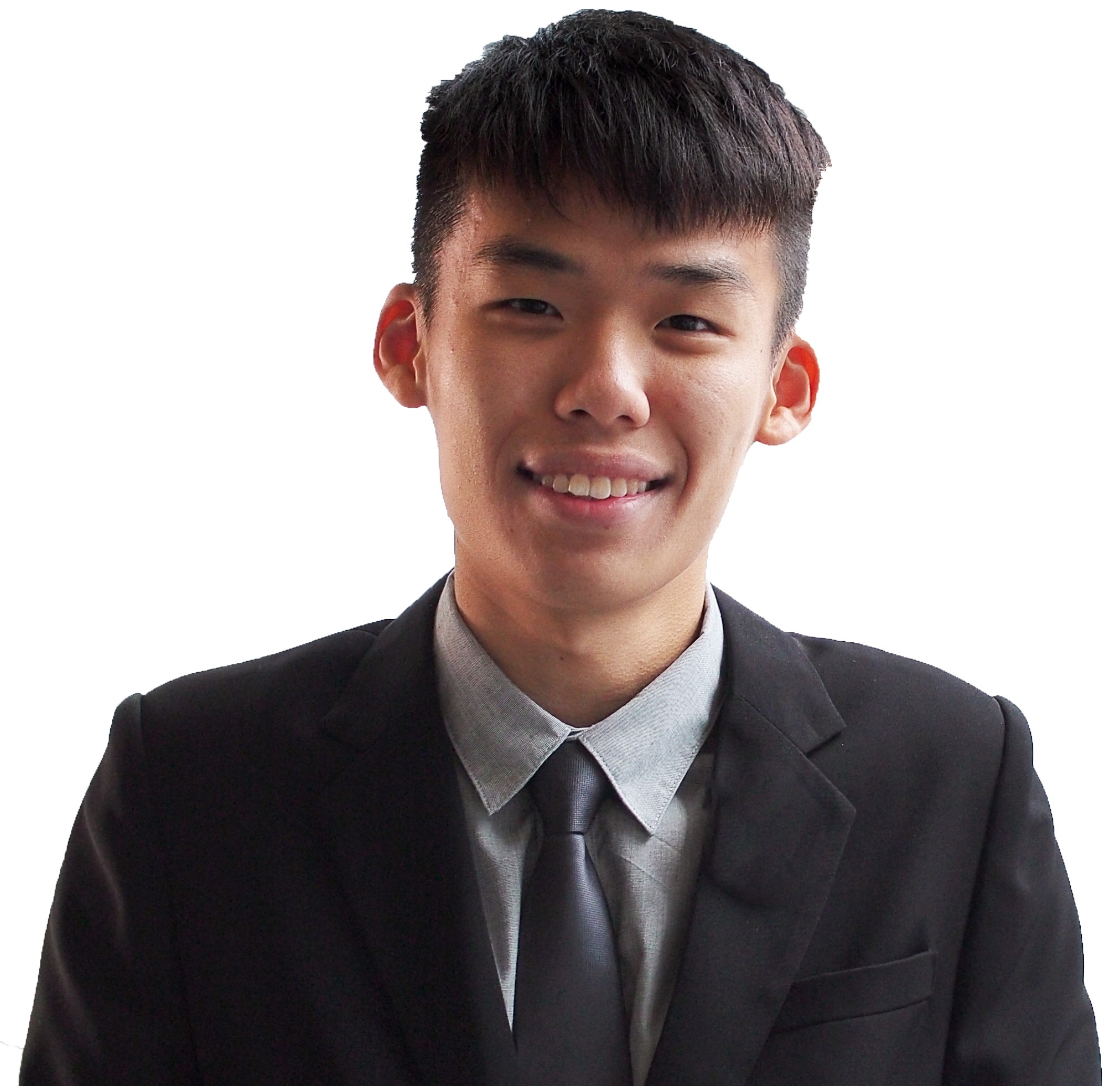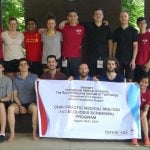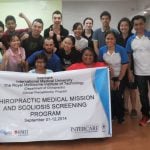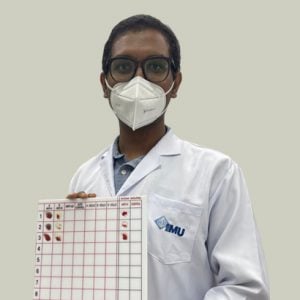Eddy Yii Chung Ann graduated from IMU with a BSc (Hons) in Pharmaceutical Chemistry in 2018. He is currently working as an Analytical Research and Development Executive at Oncogen Pharma Malaysia Sdn. Bhd. For the past three years. Eddy’s job responsibility at Oncogen Pharma mainly involves reverse engineering and solid-state characterisations of oncology formulation products and active pharmaceutical ingredients (APIs).
In March 2019, Eddy enrolled into the IMU Masters in Analytical and Pharmaceutical Chemistry (MAPC) programme as a part-time student. As the MAPC programme offers both part-time and full-time options, Eddy is able to pursue his postgraduate qualification while keeping a full-time job, and he is now in the final year of his studies. We managed to catch up with Eddy to find out more about his experience of studying while working.
Why did you decide to embark on postgraduate study even though you have been already working?
To be honest, I have always imagined myself to be an 8-to-5 working adult after finishing my undergraduate course and to continue postgraduate study has never ever crossed my mind. Even if I were to imagine it, many different thoughts started to weigh in: study cost, stress management, time planning etc. Although my parents kept on persuading me to further my postgraduate study without worrying about the cost, I would just laugh and brush it off. After my bachelor’s degree, I actually did receive a few offers from IMU lecturers to continue my PhD journey and to work on their research topics under full grant. However, after considering many factors, I still declined and continued the normal working life as my daily routine.
Within a year of my working life, although I had learned various analytical techniques and pharmaceutical related knowledge, deep down I was starting to feel that I wanted to learn more from what I am capable. That was when I began to explore and enquire details from different institutions on postgraduate programmes.
After all that, I still decided to choose IMU to embark on my postgraduate journey in MSc in Analytical & Pharmaceutical Chemistry, because of its flexibility in offering both part-time and full-time modes for over a period of 2-6 years, in which I can still keep my current job while studying. Moreover, their strong research platform which is already well-known to the public also gave me a strong sense of confidence in making my decision, not forgetting that the Programme Director and the lecturers who are undoubtedly helpful in assisting their students in all aspects.
What are the challenges you face studying while working? How do you find a balance?
Till now, I do not face any difficulties in studying while working because I do not take these as a burden. In fact, I am just enjoying it as it keeps me occupied. It is true that you will have lesser personal time after studying, however I always view this as a learning opportunity to grow independently and improve myself. Sometimes, I will find it hard to stay focused on either one of them. Yet, I deeply acknowledge that we will never find a balance between work and study life, either one or both of them will become hectic at any day.
Personally, I will always first check on the priority of the tasks given and plan my work properly ahead of time.
To this, I really appreciate on how thoughtful IMU is in planning a detailed timetable and also a systematic workload sheet for each module. These have indeed help me a lot in my planning. For example, I am well-aware of when are my lectures and assignment submission dates and then allocating my time equally for both work and studies.
If the workload from studies is really hectic, I will discuss with my superior and colleagues to allow me to take a day off from work and focus on the assignments first, before heading back fresh to work again. In short, planning ahead and good communication with the team are basically my practice in balancing my work and study life.
What is your experience so far in the MAPC programme?
It is definitely pleasant. As a part-time student, I can totally feel the freedom and flexibility in choosing any modules at every semester based on my personal timetable. Besides, the lectures are always interactive and the reading resources are plentiful and easily accessible.
Nonetheless, it was rather a dismal and unforeseen situation that my intake fell during the pandemic season, for which I did not have many opportunities to be physically present for the lectures and explore other facilities like library, e-labs with advanced drug discovery software installed, practical labs, etc. which were offered in IMU. However, they managed to overcome these by offering and launching the learning experiences through various online platforms. Although it was totally a new experience to all students, I was able to adapt to it quickly and grasped on the knowledge easily.
What research are you working on in your Masters?
Since my job scope already includes in-depth analysis on pharmaceutical drug products and active pharmaceutical ingredients (APIs), I actually wish to expand my interest into formulation development for my research project. Currently, I am working on liquid crystalline nanostructure formed from lipids to be used to formulate a poorly water soluble anticancer drug which is commercially available, under the supervision of Dr Thiagarajan Madheswaran.
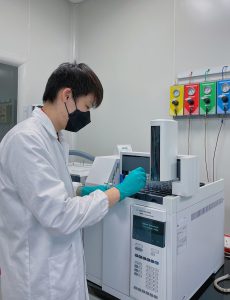
Meanwhile, we also incorporated quality-by-design (QbD) to improve our formulation and various analytical techniques to understand the physicochemical properties better. In addition, we investigated on its anticancer activity on human PC3 prostate cancer cell lines. The objectives of our research are generally to improve the drug solubility and its anticancer activity by introducing the drug into a new promising drug delivery carrier.
What are the skills/knowledge you have gained in the programme? How does it help you at work?
Besides the basic research skills, the most unforgettable knowledge I had learnt was during the quality management and regulatory management module, as this module was entirely taught by guest lecturers who have prior experiences in various pharmaceutical industries. These guest lecturers always delivered their personal work experiences during each lecture. They even brought out some real case scenarios to explain and relate with different situations to enhance our understanding. It was definitely the most interesting and interactive module as we had opportunities to share our work experiences with the guest lecturers too!
Moreover, I was also re-introduced to many guidelines and standards like ICH guidelines, ISO standards, EMA, FDA, CGMP, etc., although I had always heard of them at my workplace but I never had a chance to really understand it properly.
Besides, the assignments also required us to prepare a few protocols on validation activities and qualification testing of equipment. These assignments actually helped me to learn step-by-step on how to correctly perform validation and qualification activities in pharmaceutical field, which I never experienced at my workplace till date. Besides, as my job responsibilities mainly and only involves solid state chemistry, thus most of the time I am not really involved in wet chemistry for example USP testings on drugs, HPLC validation process etc. MAPC programme allows me to learn all these through various modules and lab practical sessions. Most of them are totally relatable and competent to what we always practice at pharmaceutical labs.
Although this knowledge may not be helpful to me at the moment, I believe that it will definitely allow me to have a more diverse career pathway in the future, for which I am totally grateful to MAPC programme at IMU.
We would like to express our heartfelt thanks to Eddy for taking time out to answer our questions.
Related article: IMU Pharmaceutical Chemistry Alumnus Shares Memorable Moments at University




